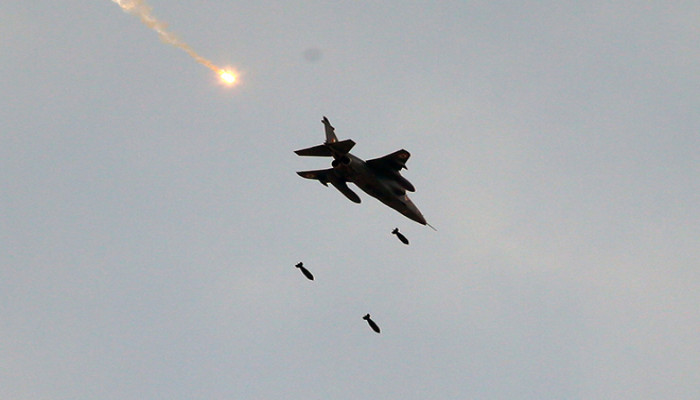Beware the Ides of February; Three Years Since Balakot: Now What?
- In Military & Strategic Affairs
- 11:05 AM, Feb 10, 2022
- Manan Bhatt
India-Pakistan Relations in Changed Geopolitical Environment
A Rude Awakening! “In war, the will is directed at an animate object that reacts.” This admonition by the strategic grand master Clausewitz, fits perfectly to explain India’s ‘Balakot response’ to the February 14, 2019 Pakistan state sponsored Jaish-e-Mohammed terrorist attack in Pulwama, Jammu & Kashmir. On the third anniversary of Balakot strikes, Prime Minister Narendra Modi and his civil-military advisors deserve credit for forcefully acting rather than letting Pakistan condition India’s answer (as seen after the 2001 Parliament attack, or the 2008 Mumbai terror strikes). In other words, the Balakot strikes, broke an established narrative that suggested there are no escalatory dangers when Pakistan commits terrorism, but only when India responds to such acts.
Playing by the rules is at the heart of games that most nations indulge in. In the case of India and Pakistan, however, the fight has traditionally been uneven. On the one hand, India is a thriving democracy, an economic powerhouse well on its way to become a great-power. On the other hand, Pakistan is considered as a failed state, which has for long indulged in nuclear scare-mongering to create a moral equivalence between a terrorist and a victim. That said, if there is one quality that India has cultivated in abundance, it is that of displaying responsibility.
Very similar to Mahabharata’s Arjuna, a reluctant warrior, who finally took up arms at Kurukshetra for the sake of duty. Or for that matter Shri Krishna’s willingness in the same epic to forgive his cousin Shishupala a hundred provocations before finally responding decisively. This article proceeds in the spirit of the Mahabharata, and its purpose is twofold.
First, it draws upon the epic to assert the merits of observing rules and the costs of violating them; and how this has adversely impacted Pakistan’s narrative to suggest that its leadership stands for peace and won big after the Pulwama attacks in 2019.
Second, it cautions India’s strategic leadership of the dangers posed by a smaller adversary (Pakistan!) whose single-mindedness goes to the extent of destroying itself to inflict damage.
Merits of Observing Rules… and the Cost of Violating Them. Pakistan has for a long time now failed to pay attention to not only the quality of cards that it has but also on how to play them against India. Relations between states, as witnessed from the times of the Mahabharata, are based on rules and the linked violation of codes of conduct. The Kaurava commander Bhishma was killed using a woman warrior as a shield. And then, Arjuna’s son Abhimanyu was attacked by multiple adversaries simultaneously, including from the rear. These examples frame a debate on the merits of observing rules and the costs of violating them. The advantage of being perceived as a rule-abiding and responsible player cannot be underestimated.
In 2006, the India – U.S. civil nuclear deal is a good example of how the world was more trustful of India than Pakistan to accommodate its nuclear aspirations. Similarly, in maritime claims, India’ acceptance of an arbitral award regarding Bangladesh in 2014 contrasts the ongoing dispute between India and Pakistan over the maritime boundary line; and the recurring attacks that is mounted on innocent Indian fishermen off the Gujarat coast by the Pakistan Maritime Security Agency (its Coast Guard!).
Pakistan has only brought discredit to itself by harboring organisations such as the JeM/ Jaish, Lashkar-e-Taiba (LeT), and hard core terrorists such as Masood Azhar, Hafiz Saeed and their associates. Pakistan also does not acknowledge its soldiers engaged in hybrid warfare in India, which is not a sign of a nation that believes in the justness of its cause. The treachery of Kargil (immediately following the Lahore bus trip by the then Indian Prime Minister, Atal Bihari Vajpayee) is yet another example to highlight Islamabad’s obsession with violating a rules-based order.
Pakistan has then paid a heavy price of not playing by the rules. Its narrative that Balakot was a victory and that Pakistani leadership for the first time in history brought India under pressure over Kashmir is not only factually incorrect, but has also fallen on deaf ears around the world. While narratives are necessary to justify actions and every nation produces its own version, Pakistan has consistently failed to retain the high moral ground necessary to influence world opinions. In other words, actions speak louder than words.
Beware an Irrational Foe! In the Mahabharata, the Trigarta warriors ally with the Kauravas to avenge Arjuna, who had defeated them while preparing the ground for Yudhishthira’s coronation ceremony. It was their challenge to Arjuna of a fight to death, which diverts the ace archer away from the battlefield; resulting in the death of Abhimanyu, Arjuna’s son, who could not resist the Kauravas alone.
The moral here is of the danger of smaller adversaries whose single-mindedness goes to the extent of destroying themselves to inflict damage. That, in many ways, sums up the predicament today of India vis-à-vis Pakistan. Since 1971, Pakistan has gone to extremes in its attempt of bleed India by a thousand cuts. Under these circumstances, India’s future response to any misadventure on part of Pakistan must (1) enforce accountability for supporting non-state actors in acts of terrorism, and, (2) leverage ‘holistic’ application of all instruments of national power, with the use of force, or compellence, being the last but not the least option on the table.
Finally, Neighbours are not a matter of choice, just as relatives were not in the Mahabharata. India will have to deal with what comes out of Pakistan itself. From Ukraine to Afghanistan, the shifting sands of global politics have already begun to determine the context for national choices. India’s strategic leadership has until now excelled at cultivating the strategic ambiguity required to deal with modern day Shishupalas (read Islamabad!). The Balakot strikes are an excellent example to illustrate this strategy. We trust the adversary has learnt its lesson and redrawn its proverbial ‘red-lines’ and realigned its much-hyped narrative of what the Indians call the ‘nuclear bluff.’!
Image source: Orfonline.org







Comments